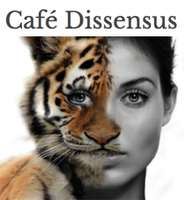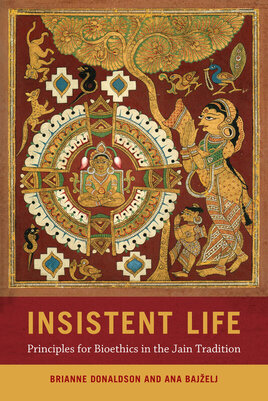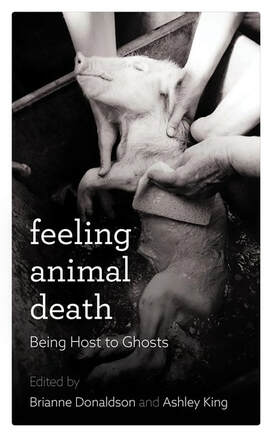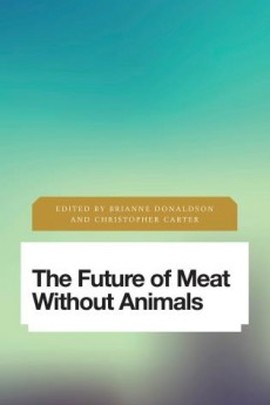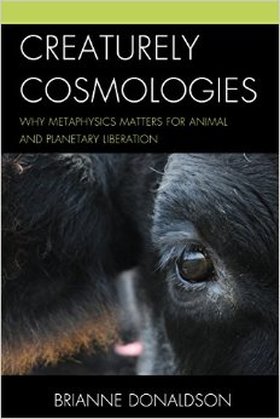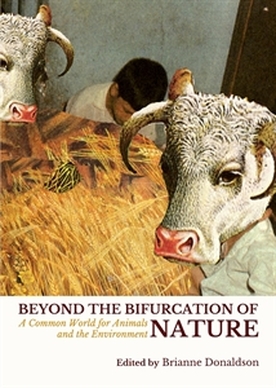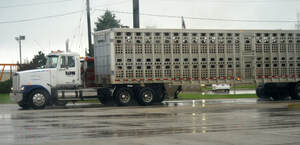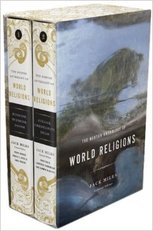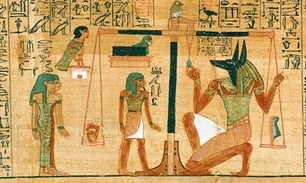BOOKS
|
Insistent Life: Principles for Bioethics in the Jain Tradition, co-authored with Ana Bajželj (University of California Press, 2021).
*Free, open-access ebook is also available here (UC Press Luminos) or here (thru Kindle). Insistent Life is the first full-length interdisciplinary treatment of the foundational principles and principles of application for engaging contemporary bioethics within the Jain tradition. The book fills a significant gap in both the fields of bioethics and Jain studies since Jainism, perhaps more so than any other South Asian tradition, is strongly focused on the ethics of birth, life, and death, with regard to humans, animals, and other living beings. Brianne Donaldson and Ana Bajželj analyze a diverse range of Jain texts and contemporary sources on Jain doctrines and practices, alongside bioethics, to identify Jain perspectives on bioethical issues while highlighting the complexity of their personal, professional, and public dimensions. The book also features extensive original data—represented in visual graphs—based on an international survey the authors conducted with Jain medical professionals in India and diaspora communities of North America, Europe, and Africa. |
|
Feeling Animal Death: Being Host to Ghosts, ed. Brianne Donaldson and Ashley King (Rowman and Littlefield International, 2019).
"This is an ambitious collection that brings an intimate voice to the discussion of ethical issues that are usually developed in more distanced rights-based discussions." —Jane Desmond, University of Illinois at Urbana-Champaign The emotional exchange between so-called “humans” and more-than-human creatures is an overlooked phenomenon in societies characterized by the ubiquitous deaths of animals. This text offers examples of people across diverse disciplines and perspectives—from biomedical research to black theology to art—learning and performing emotions, expanding their desires, discovering new ways to behave, and altering their sense of self, purpose, and community because of passionate, but not romanticized, attachments to animals. By articulating the emotional ties that bind them to specific animals’ lives and deaths, these authors play host to creaturely ghosts who reorient their world vision and work in the world, offering examples of affect and feeling needed to enliven multi-species ethics. Read Table of Contents and Introduction here. |
|
The Future of Meat Without Animals, ed. Brianne Donaldson and Christopher Carter (Rowman and Littlefield International, 2016)
With contributions by the CEOs of Beyond Meat, Just (formerly Hampton Creek), Miyoko's Creamery, and New Harvest, among many other perspectives and views. "Are we on the edge of a future without meat from animals? For the past 45 years, I've been waiting for that future. It's not here yet, but this collection of diverse essays gives reason to hope that - despite the major obstacles still standing in the way - it is not far away." —Peter Singer, author of Animal Liberation Plant-based and cell-cultured meat, milk, and egg producers aim to replace industrial food production with animal-free fare that tastes better, costs less, and requires a fraction of the energy inputs. These products are no longer relegated to niche markets for ethical vegetarians, but are heavily funded by private investors betting on meat without animals as mass-market, environmentally feasible alternatives that can be scaled for a growing global population. This volume examines conceptual and cultural opportunities, entanglements, and pitfalls in moving global meat, egg, and dairy consumption toward these animal-free options. Beyond surface tensions of “meatless meat” and “animal-free flesh,” deeper conflicts proliferate around naturalized accounts of human identity and meat consumption, as well as the linkage of protein with colonial power and gender oppression. What visions and technologies can disrupt modern agriculture? What economic and marketing channels are required to scale these products? What beings and ecosystems remain implicated in a livestock-free food system? A future of meat without animals invites adjustments on the plate, but it also inspires renewed habits of mind as well as life-affirming innovations capable of nourishing the contours of our future selves. This book illuminates material and philosophical complexities that will shape the character of our future/s of food. View Table of Contents, Introduction, and Zine of Strategies for alt-meat producers. |
|
Creaturely Cosmologies: Why Metaphysics Matters for Animal and Planetary Liberation (Lexington Books, 2015)
Keywords: Process-relational philosophy, Jainism, Critical Animal Studies "A fine example of [a] multi-pronged, intersectional approach can be found in Brianne Donaldson's Creaturely Cosmologies: Why Metaphysics Matters for Animal and Planetary Liberation (Lexington 2015). Donaldson creatively takes up the challenge of linking work in critical animal studies with a broader ontological and political framework that extends beyond the human in a variety of directions. Her work is crucially important for current discussions in animal studies inasmuch as she is committed as both an activist and theorist to animal liberation while also working to expand non-anthropocentric politics to include a wide variety of other beings and relations."
— The Year’s Work in Critical and Cultural Theory Metaphysics—or the grand narratives about reality that shape a community—has historically been identified as one of the primary oppressive factors in violence against animals, the environment, and other subordinated populations. Yet, this rejection of metaphysics has allowed inadequate worldviews to be smuggled back into secular rights-based systems, and into politics, language, arts, economics, media, and science under the guise of value-free and narrowly human-centric facts that relegate many populations to the margins and exclude them from consideration as active members of the planetary community. Those concerned with systemic violence against creatures and other oppressed populations must overcome this allergy to metaphysics in order to illuminate latent assumptions at work in their own worldviews, and to seek out dynamic, many-sided, and relational narratives about reality that are more adequate to a universe of responsive and creative world-shaping creatures. This text examines two such worldviews--Whitehead’s process-relational thought in the west and the nonviolent Indian tradition of Jainism—alongside theorists such as Gilles Deleuze and Félix Guattari, Judith Butler, Donna Haraway, Karen Barad, that offer a new perspective on metaphysics as well as the creaturely kin and planetary fellows with whom we co-shape our future. View Table of Contents and Introduction. Available at online retailers and Rowman and Littlefield site. |
|
Beyond the Bifurcation of Nature: A Common World For Animals and the Environment (Cambridge Scholars Publishing, 2014)
"This is an exceptionally important collection of essays, showcasing the wide range of possibilities inherent in Whitehead’s writings for thinking about central issues in animal, plant, and environmental ethics. This volume will be welcomed especially by scholars of Whitehead’s work as well as readers who wish to think more carefully about our ontological and ethical relations with the more-than-human world." --Matthew Calarco, author of Zoographies and Thinking Through Animals Environmental destruction, animal abuse, and widespread indifference toward plants and elemental systems demand that a human-centric view of the world be permanently dismantled. But once it is, what functional hierarchies take its place, if any? This volume brings Alfred North Whitehead’s process-relational worldview into conversation with deeper empirical perspectives on science and religion, with activist and de/constructive philosophies, with South Asian and indigenous traditions, and with art and ethical theory to ignite new nonviolent experiments in thought and action adequate for our current buzzing planetary multiplicity. View the Table of Contents and Introduction Available at Amazon, other retailers, and the CSP site. |
CHAPTERS/ARTICLES

"Jainism, Solidarity, Animals" in Solidarity With Animals: Promises, Pitfalls, and Potential, ed. Alasdair Cochrane and Mara-Daria Cojocaru (Oxford 2024). Read here.

"Unifying, Globalizing, and Reinterpreting 'Practical Nonviolence' through the Covid-19 Pandemic Response of North American Jains," Nova Religio 26.3 (2023): 52–79. Read here

"Jain Medical Professionals’ 'Reflexive Ethical Orientation': Adaptive Nonviolence, Multiple Sources of Knowledge, and Concern for Five-Sensed Beings," Religions 13: 1123. Read here

"Jainism and Nonviolence: Variable Practices of an Ultimate Principle," Nonviolence In the World's Religions, ed. Jeffery D. Long and Michael J. Long (Routledge 2021).
Read here.

"Jainism and Darwin: Evolution Beyond Orthodoxy," Asian Religious Responses to Darwinism: Evolutionary Theories in Middle Eastern, South Asian, and East Asian Cultural Contexts, ed. C. Mackenzie Brown (Springer, 2020).
Read here.
Read here.

"Witness at the Slaughterhouse: Seeking Conflicting Propositions for Alternate Futures," Propositions in the Making: Experiments in a Whiteheadian Laboratory, ed. Roland Faber, Michael Halewood and Andrew M. Davis (Lexington Books, 2019) [Whitehead, Nietzsche, Jainism]
Read here
Read here
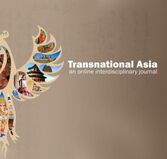
"Transmitting Jainism through U.S. Pāṭhaśāla Temple Education Part 1: Implicit Goals, Curriculum as 'Text,' and the Authority of Teachers, Family, and Self," Transnational Asia 2 (1), no. 2 (2019): 1-45.
Read here.
Read here.
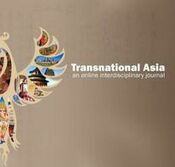
"Transmitting Jainism through U.S. Pāṭhaśāla Temple Education, Part 2: Navigating Non-Jain Contexts, Cultivating Jain-Specific Practices and Social Connections, Analyzing Truth Claims, and Future Directions," Transnational Asia 2 (1), no. 3 (2019): 1-41.
Read here.
Read here.

"Bioethics and Jainism: From Ahiṃsā to an Applied Ethics of Carefulness." Religions: Special Issues on Jainism Studies 10(4), 243 (2019): 1-19.
Read here.
Read here.

"On the Medical Doctrines in the Tandulaveyāliya, 2. Teachings of Anatomy," Translation (French to English) of the original
analysis by the late Jain scholar Colette Caillat. International Journal of Jaina Studies 15.1 (2019), 1-12
Read here.
analysis by the late Jain scholar Colette Caillat. International Journal of Jaina Studies 15.1 (2019), 1-12
Read here.
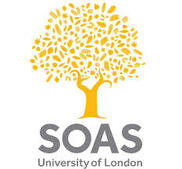
"On the Medical Doctrines in the Tandulaveyāliya, 1. Teachings of Embryology," Translation (French to English) of the original analysis by the late Jain scholar Colette Caillat. International Journal of Jaina Studies 14.1 (2018), 1-14.
Read here.
Read here.
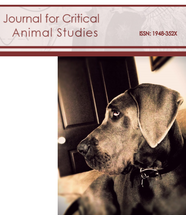
"Salvaging Shame, Saving Ourselves: The Productive Role of Shame for Animals and Marginalized Life," co-authored with student Isaac Willis. Journal for Critical Animal Studies 14.3 (2017), 4-26.
Read here.
Read here.
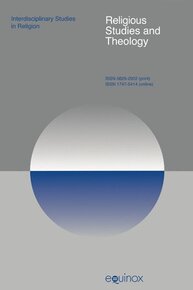
"From Ancient Vegetarianism to Contemporary Advocacy: When Religious Folks Decide that Animals Are No Longer Edible," Religious Studies and Theology 35.2 (2016), 37-57.
Read here
See the full Issue on Food and Religion here
Read here
See the full Issue on Food and Religion here
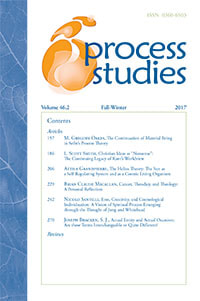
“Bad with Names: Replacing “Animal” with Whitehead’s Insistent Particularity of Bodies,” Process Studies Journal 42.2 (2014): 181-199.
Read here.
Read here.
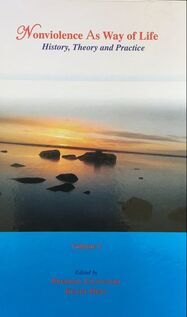
"Environmental Rites: Plants and Animals in Jain Repentance," Nonviolence As Way of Life: History, Theory and Practice, 2 Volumes, ed. Predrag Cicovacki and Kendy Hess (Motilal Banarsidass, 2016)
Read here.
Read here.
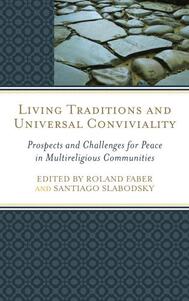
"Zones of Conviviality in Multireligious Education: Tagore and Whitehead's Experiential Religious Naturalism," Living Traditions and Universal Conviviality: Prospects and Challenges for Peace in Multireligious Communities, ed. Roland Faber, Santiago Slabodsky, and Bradley Shavit Artson (Lexington Books, 2016).
Read here
Read here
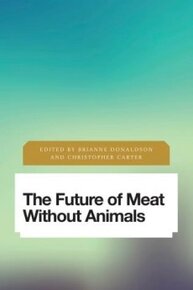
"Exploiting Fantasy: Žižek's Overconformity in Animal Agriculture, Meatless Meat and Animal Ethics," The Future of Meat Without Animals, ed. Brianne Donaldson and Christopher Carter (Rowman and Littlefield International, 2016).
Read here
Read here
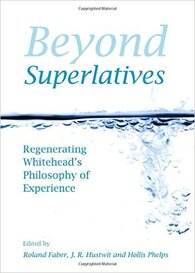
“Does Whitehead Have a Theory of Mourning?: A Response to Butler’s Inquiry,” Beyond
Superlatives: Regenerating Whitehead's Philosophy of Experience, ed. Hollis Phelps, J. R.
Hustwit, and Roland Faber (New York: Cambridge Scholars Publishing, 2014).
Read here
Superlatives: Regenerating Whitehead's Philosophy of Experience, ed. Hollis Phelps, J. R.
Hustwit, and Roland Faber (New York: Cambridge Scholars Publishing, 2014).
Read here
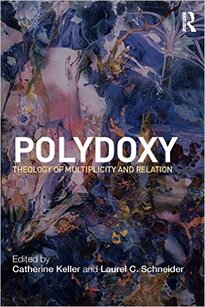
“They Will Know We Are Process Thinkers By Our…: Finding Whitehead’s Ecological Ethic Through the Lens of Ecofeminism and Jainism,” Polydoxy: Theologies of the Manifold, ed.Catherine Keller and Laurel Schneider (New York: Routledge Press, 2010).
Read here
Read here
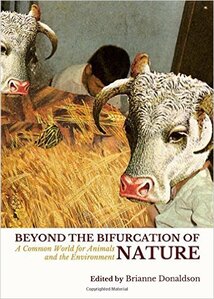
“Immortality and Omniscience: Conceptual Bridges to Reworlding in Process and Jainism,”
Beyond the Bifurcation of Nature: A Common World for Animals and the Environment, ed.
Brianne Donaldson (New York: Cambridge Scholars Publishing, 2014).
Read here
Beyond the Bifurcation of Nature: A Common World for Animals and the Environment, ed.
Brianne Donaldson (New York: Cambridge Scholars Publishing, 2014).
Read here
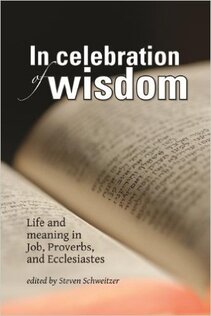
“Animals and Humanity in the World: Job 38-39” In Celebration of Wisdom: Life and Meaning
in Job, Proverbs, and Ecclesiastes, ed. Steven Schweitzer (Elkhart: Institute of Mennonite
Studies, 2009).
Read here
in Job, Proverbs, and Ecclesiastes, ed. Steven Schweitzer (Elkhart: Institute of Mennonite
Studies, 2009).
Read here
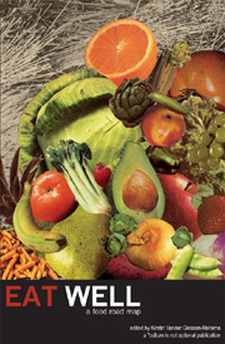
“Putting Animal Justice on the Table in Your Community: Engaging Religious Audiences”
Eat Well: A Food Road Map, ed. Kirstin Vander Giessen-Reitsma (Three Rivers MI: Culture
is Not Optional, 2008).
Eat Well: A Food Road Map, ed. Kirstin Vander Giessen-Reitsma (Three Rivers MI: Culture
is Not Optional, 2008).
ENCYCLOPEDIA ENTRIES
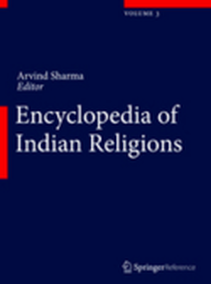
Encyclopedia of Indian Religions: Buddhism and Jainism, ed. K.T.S. Sarao and Jeffery D. Long
(Springer, 2017)
--Samavasaraṇa, Jainism
--Divya-Dvani, Jainism
--Ṇamōkāra mantra, Jainism
(Springer, 2017)
--Samavasaraṇa, Jainism
--Divya-Dvani, Jainism
--Ṇamōkāra mantra, Jainism
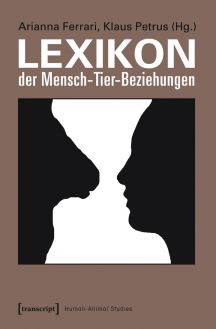
Lexikon der Mensch-Tier-Beziehungen (Encyclopedia of Human-Animal Relations, ed. Arianna Ferrari and Klaus Petrus (Transcript, 2015); in German
—Animals in Jainism (Jainismus)
—Animals in Jainism (Jainismus)
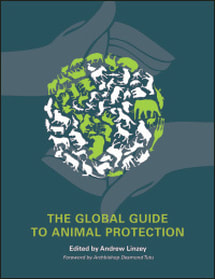
The Global Guide To Animal Protection, ed. Andrew Linzey (University of Illinois Press, 2013)
--Animal Courses in Academia
--Animal Courses in Academia
OP EDS/ANALYSIS
|
The Risks of K-9s on Campuses, at Inside Higher Ed (November 2021)
|

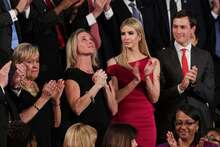
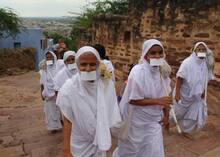
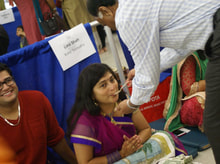

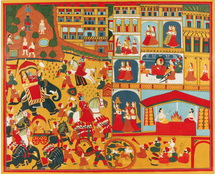 Illustrated story of Neminath,
an enlightened Jain teacher who
rejected the slaughter of animals
Illustrated story of Neminath,
an enlightened Jain teacher who
rejected the slaughter of animals
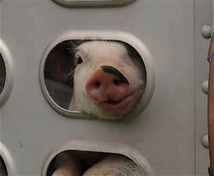 photo credit: Toronto Pig Save
http://www.torontopigsave.org/
photo credit: Toronto Pig Save
http://www.torontopigsave.org/
